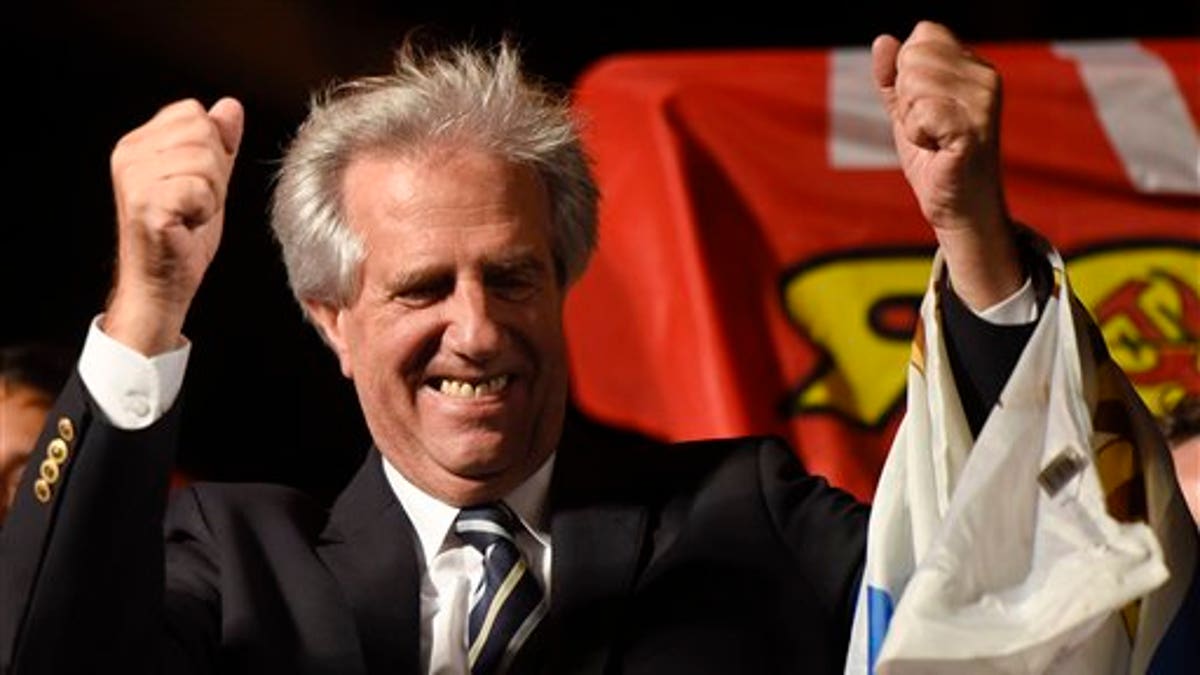
Nov. 30, 2014: President elect Tabare Vazquez celebrates in Montevideo, Uruguay. (AP)
Ruling party candidate Tabare Vazquez easily won Uruguay's presidential election on Sunday, returning to power a left-leaning coalition that has helped legalize gay marriage and moved to create the world's first state-run marijuana marketplace.
The runoff vote had drawn international attention because Vazquez's rival, center-right candidate Luis Lacalle Pou, had promised to undo much of the plan to put the government in charge of regulating the production, distribution and sale of marijuana on a nationwide scale.
Lacalle Pou, 41, said that he had called Vazquez to concede and "wish him great success" after three exit polls showed him losing by a more than 10-point margin, a defeat seen as saving the pot plan from possible extinction.
Late Sunday night, Uruguay's Electoral Court announced that with 59 percent of the polling stations counted, Vazquez had 52 percent of the vote and Lacalle Pou 42 percent.
Vazquez, a 74-year-old oncologist who was president from 2005-2010, immediately called on the opposition to join him in a national accord to deal with the key issues of public security, health and education.
"I want to be able to count on all Uruguayans, but not so that they follow me but so that they guide me, accompany me," said Vazquez as his supporters poured into the street to celebrate.
Sunday's win marked a reversal of roles for Vazquez, who shook up Uruguayan politics when he became president his first time, peacefully ending 170 years of two-party dominance. In his first presidential campaign, Vazquez promised changes that would "shake the roots of the trees." But he governed as a relatively cautious moderate, avoiding the constitutional changes and polarization that have shaken countries such as Venezuela.
His popularity on leaving office paved the way for the election of his successor, current President Jose Mujica, a former guerrilla known for his humble lifestyle and straight talk. Both men belong to the Broad Front coalition, which has been in power for a decade and has passed laws backing same-sex marriage, marijuana and other social issues.
This time around, Mujica's popularity and a strong economy helped propel Vazquez into office, where he is now seen as the candidate of continuity, not of change.
Javier Silva, an operator at a state electrical plant, said he voted for Vazquez because he thinks the country is doing well.
"The economy is rising. The country isn't anything like it was 10 or 20 years ago, when it was in decline," said the 35-year-old.
Monica Centurion, a 51-year-old official at a state hospital, said she backed Lacalle Pou because she worried about crime.
"It was for his proposals, especially to improve public security, which is the principal issue," she said describing why she voted for him.
Lacalle Pou is the son of another ex-president, Luis Alberto Lacalle Herrera, who governed from 1990 to 1995.
During his campaign, he criticized the marijuana plan, saying he would shut down the state-run pot market, while allowing domestic cultivation of the plant. Polls show that despite its international popularity, most Uruguayans oppose the marijuana laws and want them repealed. Uruguayan authorities are still in the process of rolling out the pot marketplace.
Lacalle Pou was hobbled by some voters' wariness of a return to the traditional parties that ruled through most of the country's usually peaceful history, apart from a 1973-1985 military dictatorship.
Vazquez, the tall and trim son of an oil worker, grew up in a working class neighborhood of Montevideo and went on to achieve a medical degree. He continued seeing patients one day a week during his previous presidency, but said in a recent interview that he would give up medicine to focus on the presidency if elected.
In the first round of voting in October, he fell just short of an outright victory, getting 48 percent support against 31 percent for Lacalle Pou. Mujica was barred by law from running for a second consecutive term.
